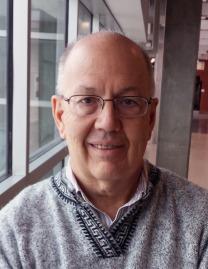Seminar on: "Polycrystal Plasticity at the Dislocation Level"
Events | Mechanical Engineering
Seminar on: "Polycrystal Plasticity at the Dislocation Level"
November 6, 2017 7:30 AM

Speaker
Professor Richard LeSar
Location
ESB 1001
Type
Seminar
Discrete dislocation dynamics (DD) simulations have been widely used to gain a better understanding of the mechanisms involved in the deformation of metals. While there are a number of variants of DD simulations, they all involve the calculation of the stress at each dislocation, the resolving of that stress as a force, and solving the equations of motion. Sub-scale models are used to describe such processes as junction formation, cross-slip, and climb. In traditional DD approaches, the stresses are found by summing analytical expressions (usually based on isotropic elasticity). Recently we have shown that the stress calculation can be done using a fast Fourier transform (FFT) method based on an eigenstrain representation of the plasticity. The FFT approach is faster than conventional methods and enables use of anisotropic elasticity with little change in computational time. Independently, Capolungo developed a similar FFT-based approach and completed an implementation of the FFT stress calculation into a dislocation dynamics code (FFT-DD), showing the FFT approach to be about 20 times faster than traditional DD. We have collaborated to link the FFT-DD method within an FFT-polycrystal framework developed by Lebensohn, enabling direct simulations of dislocation-based plasticity in fully polycrystalline systems. In this talk, we will discuss the development and implementation of the methods, and will show early results that contrast dislocation structure development in polycrystalline samples with those in single-crystal materials.
Richard LeSar is a Professor in the Department of Materials Science and Engineering at Iowa State University. He earned his B.S. In Chemistry in 1975 from the University of Michigan and his A.M. (Physics) and Ph.D. (Chemical Physics) from Harvard University in 1981. He then went to Los Alamos National Laboratory, first as a Postdoctoral Fellow and then as a Technical Staff Member. In addition to his research and leadership roles, While at Los Alamos LeSar developed a course on the computational modeling of materials in the Materials Department at UC Santa Barbara, which led, in part, to a textbook Introduction to Computational Materials Science published in 2013. In 2006, LeSar moved to Iowa State University as the Chair of the Materials Science and Engineering department, leaving the Chair position in 2012. His research focuses on using computational methods to study the properties of materials, with a focus on multiscale models of plasticity, simulating the microstructural development in additive manufacturing, and, more generally, developing new strategies for multiscale design. He served on the National Academy Committee on Integrated Computational Materials Engineering and is a former member of the U. S. Air Force Science Advisory Board. He currently serves as an Associate Editor of the Annual Review of Materials Research.